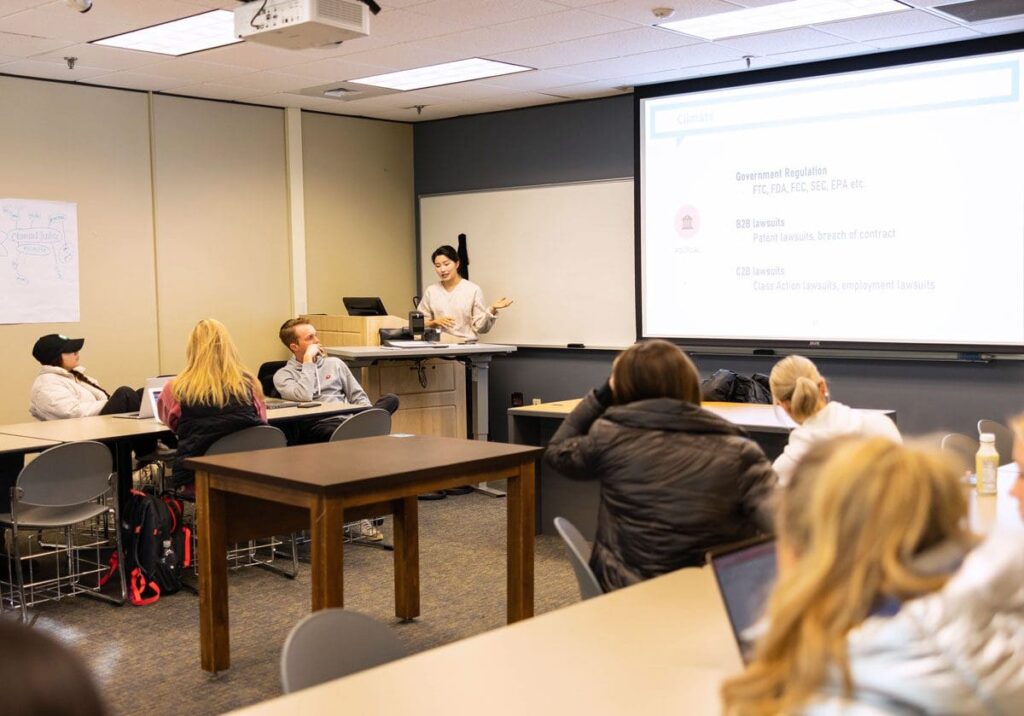
Become a Leader in Your Field
When you enter our doctoral program and pursue a concentration in advertising or public relations, you will be mentored and supported along the way by faculty. This interdisciplinary program allows you to tailor your interests and broaden your perspectives as we prepare you to be a leader in the academic world of advertising or public relations.
ADPR here at UT has allowed me to work one-on-one with some brilliant professors who constantly challenge me in my research and teaching. I feel lucky to have a school and college that prioritize their grad students!”
Shelby Luttman
College of Communication and Information doctoral student with a concentration in ADPR

Courses
Doctoral students are required to take a set of core, concentration, and cognate courses to complete CCI’s interdisciplinary doctoral degree. Core courses are taught by faculty from across the college. These courses are designed to help doctoral students understand the common threads across disciplinary areas in communication and information that are found in literature, theories, and methods to integrate knowledge and skill set.
Concentration courses are taught by faculty in each of the 4 schools. Most students define their concentration in terms of one of the disciplinary areas within the college based upon their research focus in advertising, communication studies, information sciences, journalism and media, or public relations.
Cognate courses are most often a set of courses from a discipline outside the college. Frequent cognate areas include marketing, sociology, political science, psychology, education, etc., and some students define their cognates in a more interdisciplinary way, taking courses from across the university in broad areas.
Doctoral students focus on a disciplinary area of study, meaning that the concentration and cognate courses vary for each student, depending upon the doctoral student’s research focus. Below is an example of courses a doctoral student would typically take in their first year.
Fall Semester:
- CCI 605 Philosophical and Theoretical Foundations of Communication and Information (3)
- CCI 620 Professional Development Seminar (1)
- CCI 631 Quantitative Com & Info Research Methods I (3)
- Graduate Level Statistics Course (CCI 611 or advanced statistics course) or course in Concentration Area (3)
Spring Semester
- CCI 635 Qualitative Com & Info Research Methods I (3)
- CCI 620 Professional Development Seminar (1)
- Concentration Area (CCI Level) (3) or Cognate area
- Theory Course in Concentration area (3)
Theory Courses
Students choose one from the following theory courses in their concentration area:
- ADVT 680 Mass Communication Theory (cross-listed with JREM 680 and PBRL 680)
- CMST 680 Communication Studies Theory
- INSC 680 Information Science Theory
- JREM 680 Mass Communication Theory (cross-listed with ADVT 680, PBRL 680)
- PBRL 680 Mass Communication Theory (cross-listed with ADVT 680, JREM 680)
Research at ADPR
As part of a Research 1 institution, our faculty is constantly engaged in innovative and cutting-edge research. Students working with faculty will learn how to conduct peer-reviewed academic research on a wide range of media-connected topics from sports communication to new media to political communication. Check out our faculty showcase to explore recent research produced by our faculty. Doctoral students also have the opportunity to seek support for research from the College of Communication and Information’s Research and Innovation Center (RIC).
We’re Here to Help!


Moonhee Cho
Director of College-Wide Graduate Programs
DeForrest Jackson Professor

